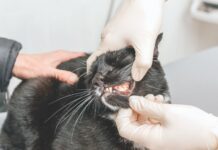My female cat keeps coming into heat. Ive never had her spayed, but is this normal?
Domestic cats are seasonally polyestrous, meaning their reproductive cycles occur multiple times during certain seasons of the year. The timing of the cycles is largely dependent on the amount of daylight. As the hours of daylight begin to lengthen in temperate parts of the northern hemisphere, the breeding season of outdoor cats starts in January or February about 20-60 days after the winter solstice and extends through September or early October. Indoor-only cats under the influence of artificial lighting may cycle throughout the year.
The stage of the cycle during which a female is fertile and will accept a male is called estrus, or heat. Estrus may last for just a few days to more than a week, and if the cat is not bred, it may recur within a few weeks or even less, only to be repeated over and over throughout the breeding season. Cats in estrus demonstrate dramatic behavior, to say the least. Loud vocalization (usually deep wails), rolling around on the floor, rubbing against objects, incessant seeking of attention, treading with the rear legs, sideways deviation of the tail and elevation of the hindquarters are commonly seen. And if there are any unneutered male cats in the neighborhood, you might find them lurking around your house. If not, you certainly will when you open the windows at the arrival of warm weather. These amorous fellows may decide to urine-mark your porch or other areas around your house, too, and tom-cat urine has one of the most unpleasant and persistent odors in all creation.
The question is, why put everyone through this? Unless you are planning to have her bred which would be unwise unless shes a valued pedigree cat in a your breeding program why not simply have her spayed? It is doing her no good to continuously go through this process, and it may even be harming her. Nor can it be contributing to your domestic tranquility. I recommend that you schedule the procedure right away.
My most recent pair of cats doesnt meow. Ive had them since they were about eight weeks old and I find it especially strange that they didnt pick it up from our other cats. Instead, the only sound they make is a sound that can best be described as a “trill.” While I enjoy their musical calls, I was wondering if you have encountered this before and whether you may know the cause.
A
The amazing variety of vocal sounds cats can produce has long fascinated cat lovers. One of the more interesting early studies on feline vocalization was conducted by Mildred Moelk from Rochester, New York, and her findings were published in the April, 1944, issue of the American Journal of Psychology. Moelk observed her own household cats over a period of about five years, and in one cat (described by the investigator as being “a female given to much vocalizing”) she was able to distinguish sixteen different phonetic patterns. Even though this particular cat must have been quite the talker, Moelk recognized all but three of these phonetic patterns in her other cats, as well. She divided the vocalizations into three main classes: first, the sounds produced while the mouth is held tensely open in one position; second, the sounds produced with the mouth kept closed; and third, the sounds produced while the mouth is opened then gradually closed. The first class of sounds is usually reserved for tense situations; the growl and the hiss are probably the most familiar examples. The second class includes the purr and the trilling or chirping sound youve heard your otherwise quiet pair of kitties produce. Moelk and others who followed her interpreted this lyrical sound as a form of vocal greeting. She noted, “Murmurs of one, two or three such rolls are most common, although mumuring may be protracted even through the length of time it takes a cat to run up a flight of steps, continuing a single [trill] all the way.”The third class of sounds includes the sexual “calls,” the aggressive “howl,” and the “meow.” Interestingly, even though the meow is one of the most common vocalizations most cats make during their interactions with people, it is rarely used during cat-to-cat communication. In fact, some researchers believe it may be a learned response that is, cats meow because they know it gets our attention. So this is one explanation for your cats silence: Theyre getting all they want from you without having to ask. Another possible explanation stems from my own experience. Ive lived with several perfectly normal cats that would open their mouths to meow, but no audible sound would come forth. It stands to reason that, just as there is much variation in human voices, the same is true of cats, too.
v


